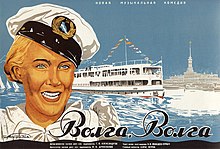Volga-Volga
| Volga-Volga | |
|---|---|
 Film poster, 1938. | |
| Directed by | Grigori Aleksandrov |
| Starring | Lyubov Orlova Igor Ilyinsky |
| Edited by | Yeva Ladyzhenskaya |
| Music by | Isaak Dunayevsky |
Release dates | April 24, 1938 (Soviet Union) May 16, 1941 (U.S.) |
Running time | 104 min. |
| Country | Soviet Union |
| Language | Russian |
Volga-Volga (Russian: Волга-Волга) is a Soviet musical comedy directed by Grigori Aleksandrov, released on April 24, 1938. It centres on a group of amateur performers on their way to Moscow to perform in a talent contest called the Moscow Musical Olympiad. Most of the action takes place on a steamboat travelling on the Volga River. The lead roles were played by Alexandrov's wife, Lyubov Orlova, and Igor Ilyinsky.
According to Orlova, the name of the film is taken from a popular Russian folk song, Stenka Razin, that Alexandrov sang while rowing with Charlie Chaplin in San Francisco Bay. Chaplin jokingly suggested the words as a title for a movie, but Alexandrov took it seriously and named his new film Volga-Volga.[1]
The feature was said to be Soviet Premier Joseph Stalin's favourite film.[2] Nikita Khrushchev in his memoirs says that in the pre-World War II period Stalin laughed at him since he resembled a character from the film.
The film is a glorification of Moscow Canal but there is not any hint in the film that this canal was built by Gulag prisoners. In 1961, a new version of a movie was released, with the "Joseph Stalin" ship cut.
In 2006, a colorization of the original black-and-white film began. The colorized version premiered on the Russian First Channel on February 14, 2010.
Background
Before Volga-Volga, Grigory Aleksandrov has created a script about a female taper (ballroom cinema pianist), Katya Muratova who can't find a better job after finishing conservatory studies. It was based on his wife Lyubov Orlova's biography. When the film is torn, and it was happening often in those days of silent films, it takes time to glue the tape, and the pianist has to fill the pauses in order to calm down the audience who is shouting "shoemakers!" and whistling in rage. So, the female pianist is playing classical music and it usually works. But once the projectionist, delighted with her performance, deliberately delays the gluing, and Katya Muratova performs the entire classical piece. The "pure" part of the public demanded to perform "the classics" instead of vulgar films, the other, of course, is against it. There is a fight. In the end, the cinema theatre was smashed to pieces, and the taper, as a result, was kicked out of work. Unfortunately, the original film script was never given a green light but the collision about the supporters of classical and contemporary music was transferred by the director to the film Volga-Volga, with the addition of angst and Lyubov Orlova playing the opposite of her Katya Muratova part.[3]
Cast
- Igor Ilyinsky - Ivan Byvalov, head of management at a small handicraft industry in the city Melkovodsk
- Lyubov Orlova - Dunya Petrova (aka 'Arrow' Russian: Стрелка, romanized: Strelka), letter carrier
- Vladimir Volodin - old pilot
- Pavel Olenev - Kuzma Ivanovich, water carrier / chef (reciter)
- Andrey Tutyshkin - Alesha Trubyshkin, accountant
- Sergey Antimonov - janitor Okhapkin
- Anatoly Shalaev - young composer
- Maria Mironova - Zoya, secretary of Byvalova
- Nikita Kondratyev - Philip Ivanovich, waiter
- Vsevolod Sanayev - bearded lumberjack / member of the symphony orchestra
- Aleksey Dolinin - policeman
- Ivan Chuvelev - chairman of the jury of the Olympics
Gallery
-
Igor Ilyinsky and Maria Mironova
-
Igor Ilyinsky
-
Lyubov Orlova
-
Andrey Tutyshkin
References
- ^ Борис Виленкин: "Как стреляли Любовью Орловой" - "КП" от 15.04.1994 (in Russian).
- ^ "Volga, Volga".
- ^ "Lyubov Orlova" (PDF). adview.ru (in Russian). DeAgostini.
External links
| External videos | |
|---|---|
- Volga-Volga at IMDb
- Volga-Volga at AllMovie
- Stalin's favourite film restored in colour, AFP, 12/02/2010.
- Soviet films
- 1938 films
- Mosfilm films
- Films set in Moscow
- Films set in Ural
- Films set in the Soviet Union
- Films set on ships
- Soviet black-and-white films
- Russian-language films
- Films directed by Grigori Aleksandrov
- 1938 musical comedy films
- Soviet musical comedy films
- Russian musical comedy films
- Russian films
- Films shot in Moscow
- Films shot in Nizhny Novgorod
- Films shot in Russia
- Films scored by Isaak Dunayevsky
- 1938 comedy films
- 1930s Soviet film stubs
- 1930s comedy film stubs





